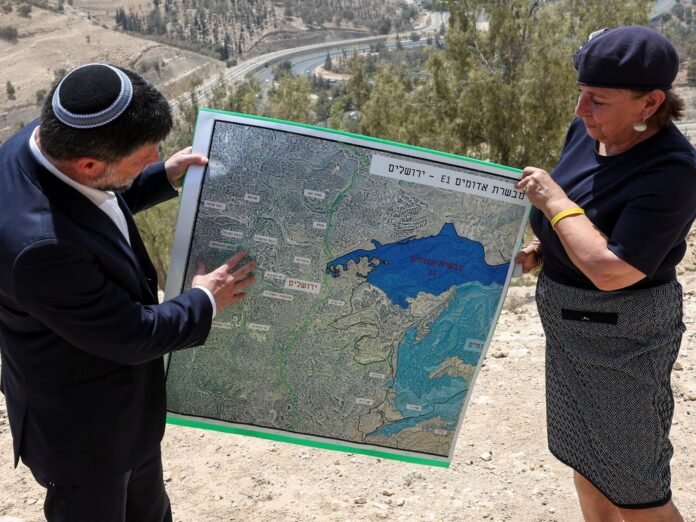Plans to develop the illegal E1 settlement, which would jeopardise a future Palestinian state, have been widely condemned.
Israel’s announcement that it will illegally build thousands of homes in a highly controversial development in the occupied West Bank – in a move Finance Minister Bezalel Smotrich boasted “buries the idea of a Palestinian state” – has drawn widespread international condemnation.
Smotrich announced Thursday that he was pushing ahead with long-frozen plans for the E1 area settlement project that would connect occupied East Jerusalem with the existing illegal Israeli settlement of Maale Adumim, located several kilometres to the east.
The planned settlement, which was shelved for years amid opposition from the United States and European allies, would comprise more than 3,400 homes for Israeli settlers on Palestinian-owned land that experts say is vital for any future territorially contiguous Palestinian state in the West Bank.
Smotrich said the development was being revived as a response to plans by other countries to recognise a Palestinian state.
But the response from the rest of the world has been scathing, with governments describing the move as a blatant violation of international law that would fuel regional instability and leave the possibility of a two-state solution to the Israel-Palestine conflict in tatters. Here’s an overview of the reactions so far.
Nabil Abu Rudeineh, spokesperson for Palestinian President Mahmoud Abbas, said the E1 development, in combination with the war in Gaza and escalating settler violence, would only lead to further escalation, tension and instability.
He said he held the US responsible for halting Israel’s expansionist actions, and noted that the settlement announcement came as Israeli Prime Minister Benjamin Netanyahu had spoken of his vision for a “Greater Israel”.
The Palestinian Ministry of Foreign Affairs, in a statement, called for international intervention to halt the settlement plans.
Saudi Arabia’s Foreign Ministry condemned the settlement plans “in the strongest possible terms”, saying they were a violation of international law and a serious threat to the possibility of a two-state solution.
In a statement, it called on the international community to “assume its legal and moral responsibilities, protect the Palestinian people, and fulfil their legitimate rights, including recognition of the Palestinian state”.
Jordan’s Foreign Ministry condemned the move in the “strongest terms”. The ministry’s spokesman Sufyan Qudah affirmed his country’s “absolute rejection and condemnation of this settlement plan and the illegal Israeli measures that constitute a blatant violation of international law and international Security Council resolutions”.
Qudah warned against the continued expansionist policy of the Israeli government in the occupied West Bank, which the ministry said “encourages the perpetuation of cycles of violence and conflict in the region”.
Palestine
The Turkish Foreign Ministry said the settlement plan “disregards international law and United Nations resolutions” and “targets the territorial integrity of the State of Palestine, the basis for a two-state solution, and hopes for lasting peace”.
It reaffirmed Turkiye’s support for an independent Palestinian state based on 1967 borders, with East Jerusalem as its capital.
The German government, a strong supporter of Israel, urged Israel to “stop settlement construction” and said it “strongly rejects” the plan for the new development
“The settlement construction violates international law and relevant UN Security Council resolutions,” a spokesperson for the Foreign Office in Berlin said.
“It complicates a negotiated two-state solution and an end to the Israeli occupation of the West Bank, as demanded by the International Court of Justice,” he added.
Spanish Foreign Minister Jose Manuel Albares called the expansion plan “a new violation of international law”.
“It undermines the viability of the two-state solution, the only path to peace,” he said in a social media post.
The United Nations urged Israel to reverse its decision. “It would put an end to prospects of a two-state solution,” Stephane Dujarric, spokesperson for UN Secretary-General Antonio Guterres, told reporters.
“Settlements go against international law … [and] further entrench the occupation.”
The European Union’s foreign policy chief Kaja Kallas also slammed the plan as a “breach of international law” that would further undermine a two-state solution.
“If implemented, settlement construction in this area will permanently cut the geographical and territorial contiguity between occupied East Jerusalem and the West Bank and sever the connection between the northern and southern West Bank,” said Kallas.
“The EU urges Israel to desist from taking this decision forward, noting its far-reaching implications and the need to consider action to protect the viability of the two-state solution.”

